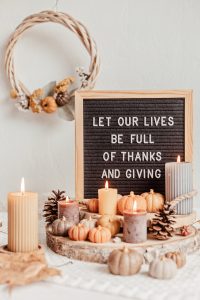Dennis Sepper, Rosemount, MN
Warm-up Question
How do you react when things do not go your way? How do you get though the rough times in life?
Hope in the Wilderness
Bernhardt Ingemann was born on May 28, 1789, the son of a Lutheran Pastor who died when Ingemann was 11 years old. Bernhardt entered the University of Copenhagen in 1806. The following year, when the British attacked Copenhagen to prevent Napoleon from taking the Norwegian-Danish navy, Ingemann helped to defend the city. His apartment and his early works were burned in the siege. In 1809 he lost his mother, three brothers, and a niece in a tuberculosis epidemic, a tragedy reflected in much of his later poetry. Ingemann was a sensitive, soft-spoken person with few friends. However, as a writer of children’s stories, he was second in popularity only to Hans Christian Andersen, whom he counted among his friends.
In 1825, Bernhardt Ingemann wrote a Danish hymn for the season of Advent. Its themes include expectant song, light through darkness, ransom, and rejoicing—many of the Advent themes. The hymn is still popular today. We know it as “Through the Night of Doubt and Sorrow.”
From elementary school all the way through college; school teachers, principals, student life staff and counselors teach students how to be “resilient.” Resilience is defined as “the capacity to withstand or to recover quickly from difficulties” in life. Resilience is a good quality to have. No matter what our age might be, we have to face some challenging circumstances or experiences.
This Third Sunday of Advent has been known as Gaudete Sunday or the Sunday of Joy. Sometimes this Sunday is represented in the Advent wreath by a pink candle instead of the usual blue or purple. In our second lesson text, Saint Paul encourages us to “rejoice always.” This is where the characteristic of resilience comes to be a strength. Facing tough times and coming through them often leads to personal growth and even a stronger resolve of character.
In addition, as Christians, we have the faith and the promise of God that no matter what happens in the world or in our lives, Jesus is with us to bear us up and carry us through. We can manufacture joy by playing a favorite game or eating a favorite food, but those do not last very long. Our joy, our resilience, comes from God and Christ. That is what helped Bernhardt Ingemann not only cope with the difficulties of his life, but also gave him the strength to write the words to a hymn that is as meaningful to us today as it was to him and those around him back then.
Discussion Questions
- Read the words to Ingemann’s hymn (ELW 327, LBW 355). Where do you see words of hope? Words of joy? Words which would reveal resilience?
- Hope and light are major themes of Advent. Where do you see signs of hope today? Where is there light shining in the darkness?
- What hymn or song instills hope in you? What hymn or song brings you joy?
Third Sunday of Advent
(Text links are to Oremus Bible Browser. Oremus Bible Browser is not affiliated with or supported by the Evangelical Lutheran Church in America. You can find the calendar of readings for Year B at Lectionary Readings.)
For lectionary humor and insight, check the weekly comic Agnus Day.
Gospel Reflection
People tried to avoid the wilderness. Yet, people were willing to enter the wilderness to seek John the Baptist. Sometimes entering the wilderness is what people do in order to gain something like peace or joy. We cannot always avoid facing a bad situation or somehow make it better. The best we can do is pray and remember the promise of God and Jesus that they are always with us, no matter what has happened.
Notice that some of the people in today’s gospel text believed that John might be the promised messiah or the prophet Elijah coming back into the world. One of our tasks in life is to figure out who we are called to be. Who are we in the world and in our communities? Most times the people closest to us help us figure that out. They tell us what they see as our strengths or what talents they see in us. But sometimes people place expectations on us that are not as good for us.
That is what happens to John the Baptist. People really want him to be the Messiah, the Chosen One. They would accept John as the Christ in a moment. However, John knows his place. The Bible says “He [John] confessed and did not deny, but confessed, ‘I am not the Messiah.’” John knows he is a witness to the coming of Jesus, the true Messiah.
Sometimes we humans forget our place. We fool ourselves into believing we can fix any problems that come our way, forgetting that we are God’s creatures and it is God and Jesus who can get us through the troubled times.
In the opening verses of today’s Gospel text, the author John refers to Jesus as “the light.” Later in John’s Gospel Jesus refers to himself as the “light of the world” (John 8:12). In a world where electricity did not exist, light in the darkness was a blessing. Jesus, as the light entering the darkness of the peoples’ lives and giving light to one’s path forward, is a powerful symbol of what Jesus means to the people and to the world. When we find ourselves in times of darkness, the light of Jesus can give us hope and see us through whatever difficulty we are in.
Discussion Questions
- What are some of the wildernesses in the world today? Are people willing to face and enter the wilderness in order to grow and gain strength?
- How do we Christians bear witness today to the presence of Jesus?
- Is the symbol of light still a powerful one in our day? Why?
Activity Suggestion
As children we sang the song “This Little Light of Mine, I’m Gonna’ Let it Shine.” Think of one of your gifts or characteristics that you can let shine for your friends and your community. Identify a gift in one other person and tell them how that gift is shining for others.
Closing Prayer
Loving God, let the light of Jesus shine in our lives, in our communities and in the world. Help us to be like John the Baptist, knowing our place before you. Help us also to be like John in bearing witness to Christ and the hope Jesus’ presence can give. Guide us in the Advent days ahead until we sign the carols and hymns of Christmas announcing the birth of Jesus. Amen





